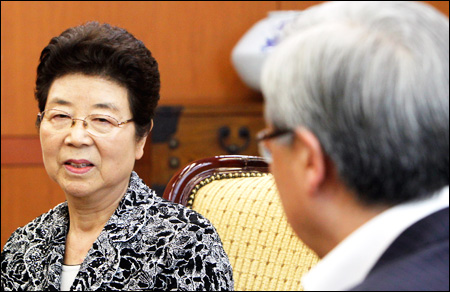Parochial China

Cho Sung-ja, mother of Kim Young-hwan, talks with Foreign Minister Kim Sung-hwan at the Foreign Ministry building, Thursday. Kim, a human rights activist for North Korean residents, has been arrested by Chinese authorities on suspicion of “espionage and being a threat to national security.”
China often shows the opposite characteristics of Oskar Matzerath, an adult trapped in a child’s body in Gunter Grass’s novel, The Tin Drum. The Middle Kingdom has experienced explosive growth for the past three decades, enabling it to replace Japan as the world’s No. 2 economic powerhouse, second only to the United States. In other words, it is a giant in the global economy. But the way it behaves appears to be as good, or rather as bad, as prior efforts to open up in the 1970s. Simply put, China today reminds its neighbors of a naughty child that doesn’t adhere to classroom rules and acts the bully.
For instance, China has detained Korean nationals and denied them access to lawyers and family members in violation of international norms and rules. Of course, it is well known what China thinks about human rights, the latest case being Chen Guancheng, a blind lawyer and activist who last week escaped from “illegal” house arrest and sought refuge in the U.S. Embassy in Beijing. A foreign ministry spokesman called China a “difficult nation” to deal with, a phrase, which, if its diplomatic niceties were taken off, would translate into the country’s arrogance that dates back to its imperial age.
But Beijing’s arrogance goes beyond its poor level of human rights.
It often bullies to get its way and makes no hesitation to flex its muscles when it comes to territorial claims. With its military stronger and more sophisticated, its neighbors worry more about how horrible Pax Sinica would be. An interesting aspect is that its ironfisted rule fails to discipline its fishing “pirates” who regularly trespass into Korean waters and trawl for fish. Is Beijing feigning helplessness?
The China paradox may come from the limits on the coexistence of communism and capitalism that has worked well so far for the nation. Unless it matches its material growth with more responsible behavior, China’s global leadership could be a horror story for the rest of the world. — ED.
`Saving Kim Young-hwan’ campaign set in motion
Activists here are gearing up to launch a campaign to support four South Korean human rights activists, including Kim Young-hwan, who have been detained in China for 50 days so far.
They have initiated collaboration with leading international human rights groups to put pressure on China to obtain the release of the detainees.
The global campaign comes as China faces mounting criticism from Korean bloggers after its detention of the activists was made public.
Choi Hong-jae, a spokesman of the Seoul-based non-profit Network for North Korean Democracy and Human Rights, said the group will step up efforts to raise international awareness of the detainees.
“We’ll call on the Ministry of Foreign Affairs and Trade to pressure China to live up to its commitment of being a responsible state. At the same time, we will also team up with international human rights groups to spread the word of the Chinese government’s abuses of human rights,” the activist said.
The group has contacted Amnesty International and Human Rights Watch to launch a global campaign for the detainees. Choi said it will also ask the United Nations for assistance.
On Thursday, Choi, along with Kim’s mother, met Foreign Minister Kim Sung-hwan to press for government help to gain the release of the four South Koreans.
Activists said they have received many encouraging phone calls and comments from citizens since they began the campaign.
Beijing’s detention of the four drew a barrage of criticism from Korean bloggers. They accused China of arresting and detaining the South Korean human rights activists without specifying the reason, urging it to release them immediately.
An Internet user identified as Park Il-nam tweeted he was upset at China for holding the South Koreans. “China continues repatriating North Korean refugees, despite international pressure. Now they are detaining South Korean human rights activists,” he said.
A blogger using the ID of “Agamemnon0” said on his tweet that he didn’t believe North Korean human rights activists did anything to destabilize China’s national security as Beijing has claimed.
The Liaoning branch of the Chinese Ministry of State Security arrested and imprisoned the four activists, alleging they were engaged in “espionage and were a threat to national security.”
However, it failed to elaborate how they violated local law. The ministry also refused to allow Kim access to a lawyer.
Detaining foreigners without specifying how they violated the local law and rejecting their right to have a lawyer constitutes a violation of international law, human rights activists here claimed.
Those who are close to Kim said the human rights activist has no reason to commit anything hostile against China as he was supportive of the country’s economic reforms and efforts to bolster ties with South Korea.
They suspect that North Korea might be behind the arrest and detention of Kim who was once a pro-North Korea activist who met the late leader Kim Il-sung in person in the early 1990s.
After the meeting, Kim changed his mind as he realized that North Korea was not the ideal country he had imagined
He then became a human rights activist for North Koreans. <Korea Times/Kang Hyun-kyung>




















































Pingback: Parochial China | THEAsiaN | Human Rights Activists | Scoop.it